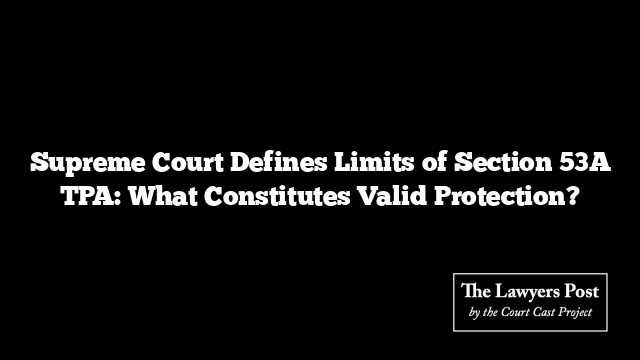The Supreme Court recently clarified the conditions under which Section 53A of the Transfer of Property Act, 1882, can be invoked, emphasizing that a transferee cannot claim its protection without proving the execution of a sale agreement that substantiates their possession.
The Case at Hand
The dispute arose when the plaintiffs sought a declaration of title and recovery of possession for a parcel of land, alleging that the defendants had no valid claim. The defendants countered by citing Section 53A of the Transfer of Property Act (TPA), claiming rights to the property through part-performance of an agreement allegedly executed decades earlier.
The defendants argued that a sale agreement dated November 25, 1968, granted them possession of the property. They contended that Section 53A shielded them from any enforcement action by the plaintiffs, asserting their rights as transferees under an unregistered contract.
Judicial Findings
The trial court, First Appellate Court, and the Karnataka High Court all ruled in favor of the plaintiffs, stating that the defendants failed to substantiate their claim. The courts found no evidence to prove the existence of the alleged sale agreement.
The Supreme Court upheld these findings, stating that the absence of proof invalidated the defendants’ claim to protection under Section 53A. It clarified that Section 53A, intended as a shield for transferees in possession under incomplete contracts, applies only when specific conditions are met.
Prerequisites for Invoking Section 53A
The Court outlined the following conditions as essential to invoke Section 53A:
- Written Contract: A written agreement by the transferor, signed by them or on their behalf, containing clear terms for the transfer of immovable property for consideration.
- Possession: The transferee must have taken or retained possession of the property in part-performance of the contract.
- Performance: The transferee must have performed or demonstrated willingness to fulfill their part of the contract.
The Court noted that the provision aims to protect transferees who, relying on unregistered agreements, take possession or make significant improvements to the property. However, this protection is contingent on meeting the statutory prerequisites.
Conclusion
In this case, the defendants’ failure to prove the existence of a sale agreement and the absence of legal validity in their possession negated their claim under Section 53A. The petition was dismissed, reaffirming that legal safeguards under the TPA require demonstrable adherence to its conditions.
This ruling serves as a reminder of the evidentiary burden placed on those invoking statutory protections, reinforcing the need for clear documentation in property transactions.





